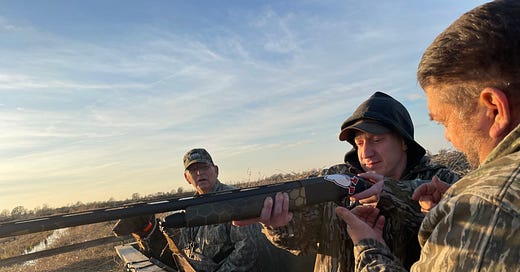When I told a friend in Los Angeles, where I live, that I was covering an event in Stuttgart, a town in Arkansas about an hour’s drive from Little Rock, he said to me: “Don’t get shot.” By this he meant he hoped none of the trigger-happy hunters down there would be set off by my general irreverence and irrepressible gayness (it’s a voice thing, I don’t know what to tell you).
I’m not quite sure what he was imagining; I was there to learn about duck calling, not to throw on a dress and become a school librarian.
Yes, I said “duck calling.” If you’re new to this, duck calling means blowing into a small handheld contraption (a duck call) that, properly manipulated, produces a sound remarkably similar to the mating calls of ducks. Hunters use them to lure waterfowl to their untimely deaths.
The occasion of my visit was the annual Wings Over the Prairie Festival, a weeklong fair culminating in the World’s Championship Duck Calling Contest, which has been a Stuttgart institution for nearly ninety years. The contest is a multidivisional, multigenerational affair at which contestants are judged by a panel of dignitaries who sit behind a screen, not unlike a Juilliard audition. The competition grants five titles in all, from the juniors up through seniors over 60. For some reason, there is a separate women’s category—though women are eligible in the main event if they’ve qualified by winning a regional title. (As yet there have been no controversies surrounding transwomen’s participation.) After about 700 rounds, the main championship title was awarded this year to a guy named Nick Brichacek of Schuyler, Nebraska, who told me he’d always dreamed of becoming World Champion.
“World Champion” is perhaps a bit grandiose; while 38 states were represented at this thing, there was no international presence. I was sensing a pattern here: ducks apparently love Arkansas, and I guess Stuttgart in particular, for its green timber, and the town is also home to Riceland Foods, a major miller and exporter of rice. These two facts underlie Stuttgart’s self-proclaimed status as the “rice and duck capital of the world.” Which, to be fair, it may very well be. Surely, the rice capital of the world is somewhere in Asia, and who knows where the duck capital of the world is, but if you’re looking for rice and duck, I’ll bet nowhere beats Stuttgart.
Alongside the duck calling, my time in Arkansas had me rubbing elbows with Americans whose relationship with guns and animals diverged pretty sharply from my own. Hell, when I was four, I caught a glimpse of a bass my grandfather caught at my parents’ lake house as it lay dying in our kitchen sink awaiting evisceration, and I have never been the same.
The people I spoke with were made of tougher stuff, or at least they said they were. I asked folks about the first time they killed an animal—was any part of them sad? “I was just trying to feed my family,” one eleven-year-old told me, before disabusing me of the notion that people, at least around there, tended to hunt for sport. Apparently, hunting is a way of securing food. Who knew?
Another guy I spoke to admitted to having more ambivalent feelings about his first kill, a rabbit, when he was about five. “I think you have to do it to understand it,” he told me.
As it turned out, I got the chance to at least try and understand it when I met Doug Williams, a 59-year-old dog trainer from Troy, Alabama, who regularly visits Arkansas for duck-hunting season, and who very graciously invited me to accompany him on a duck hunt. For several hours on the day after the competition, I hunkered down with him and his friend Randy in the middle of a flooded rice field and watched them shoot ducks.
I am happy to report that at no point did they appear to want to shoot me.
Ben Kawaller is an L.A.-based writer and host. Watch his last Free Press video, “Peace Is for Suckers.”
Become a Free Press subscriber today:














Ben, I believe the more you visit rural America, the more you and your city dwelling readers will come to respect and appreciate it.
Ok, "Dog Butler" is the winner of the day! 😂❤️